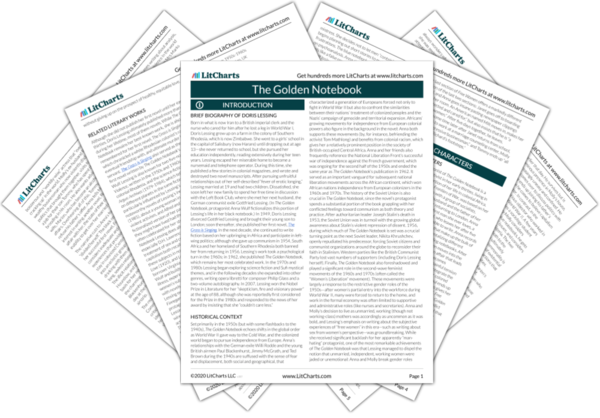Fragmentation, Breakdown, and Unity
From the very beginning of The Golden Notebook, when protagonist Anna Wulf tells her closest friend and confidant Molly Jacobs that “everything’s cracking up,” the fragmentation of world and mind emerge as driving forces in the novel. Its plot revolves around Anna’s own gradual mental breakdown, or “crack up.” Throughout the novel, she writes endlessly about her deep fear of insanity in four different notebooks in different colors that cover four different aspects of…
read analysis of Fragmentation, Breakdown, and UnityGender, Labor, and Power
When Anna and Molly describe themselves as “free women,” they are being consciously ironic—they do not feel “free,” they are not “free” from social pressures and attitudes that constrain their potential and define them in terms of their relations to men, and because they are unmarried, men see them as sexual objects, “free” for the taking. Yet Lessing’s early readers were right to see these characters’ ability to recognize and reject oppressive gender roles as…
read analysis of Gender, Labor, and PowerLove and Sex
While Anna Wulf’s rich internal life and deep understanding of the way patriarchy conditions her world have given Lessing’s novel a canonical place among classics of Western feminist literature, some readers also note the brutal irony of Anna and Molly’s situation: while they are perfectly capable of supporting themselves without men, they nevertheless long to get married; they seek love and define themselves by their quest for it, even while men treat them…
read analysis of Love and Sex
Communism and Disillusionment
The red notebook focuses primarily on Anna’s ambivalent relationship to communism, which she agrees with in theory but finds difficult to support in practice, because she finds the British Communist Party unnecessarily dogmatic, stuck in the past, and unable to cope with communism’s transformation into authoritarian terror in the Soviet Union. Many of the novel’s communists blindly defend the Party and others become so disillusioned that they lose faith in politics altogether. Anna herself…
read analysis of Communism and DisillusionmentAction, Freedom, and Moral Courage
Throughout The Golden Notebook, Anna Wulf’s central feeling is what Tommy describes as “paralysis of the will.” Anna is unable to write, love, or commit to politics, even though she knows what she wants and what she must do to achieve it. For Anna, thought and action are not merely disconnected; they are actually opposites: the more Anna reflects, the less she feels able to act, and when she does act, it is…
read analysis of Action, Freedom, and Moral CourageFact, Fiction, and Authorship
In writing a novel about a novelist and her novels, Doris Lessing comments extensively on the relationship between “fact” and “fiction,” the artist and her work. The protagonist Anna Wulf has long ago published her first novel, Frontiers of War, to commercial success. In Anna’s black notebook, the reader encounters the supposed “facts” that Anna folded into Frontiers of War; and in her yellow notebook, the reader sees her next attempt at…
read analysis of Fact, Fiction, and Authorship






